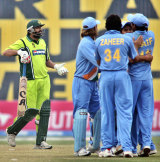Inzamam's reaction leaves a bad taste
Osman Samiuddin on how Inzamam-ul-Haq's post-match reaction to his controversial dismissal at Pashawar was so wide of the mark
Osman Samiuddin
10-Feb-2006
To read a selection of readers' comments, click here
If you haven't seen the incident referred to, then google.com has a video clip of it
|
|

|
Law 37 (1) states that a batsman is obstructing the field if he willfully obstructs or distracts the opposing side by word or action. It is also obstruction if a batsman willfully, and without the consent of the fielding side, strikes the ball with his bat or person - other than the hand not holding the bat - after the ball has touched a fielder. And Law 37 (2), on accidental obstruction, states it is for either umpire to decide whether any obstruction is willful or not. Inzamam patting the ball back appeared willful and, in any case, both umpires consulted each other before ruling him out. That incident and its aftermath, however, revealed two disturbing aspects.
The first was that Inzamam wasn't aware of the law. Given the abundance of rules and subsections governing the game, it is futile - though not unfair - to expect captains to be intimately aware of their minutiae. At least, knowledge of those concerning dismissals is prerequisite for every captain and player. Granted, it is an uncommon mode of dismissal - he was only the third man in ODI history to be dismissed in such a manner - but rarity should not justify ignorance.
Inzamam wrote in his column for The News: "Such not very common laws need to be explained properly and in detail." Is it not incumbent upon a player to know them himself? And if they need explaining to one with a 100-plus Tests and 350 ODIs, in a career spanning nearly 16 years, it reveals more about the player than the laws. That Inzamam should have known the law brooks no argument, defense or justification.
It wasn't the first time either that he has been caught unawares; in Pakistan's seven-wicket win at Wellington, in 2003-04, he shunned the extra half hour on the fourth day 28 runs from victory. Showers and inconsistent weather were expected on the final day and the decision bemused and shocked observers. To Pakistan's horror, play was delayed on the final morning but, luckily, only for an hour. The win was duly completed. In quite a different way, that situation also reflected a similarly dangerous lack of awareness of situation and circumstance.
But more regrettable than his ignorance are comments in the aftermath which only compound his folly. By publicly accusing India of acting outside the spirit of cricket he raised a question, of sportsmanship and spirit of the game, when it needn't have been invoked. The match was delicately poised in favour of Pakistan, Inzamam's was a crucial wicket and India needed it. The mode of dismissal was legitimate and the appeal as sporting or unsporting as any for an edge, leg-before, stumping or run-out. Incidentally, the appeal was also as genuine as the one Pakistan made when Sachin Tendulkar was run out at Eden Gardens in 1999, another dismissal that sparked debate about the spirit of cricket.
Tendulkar appeared to have grounded his bat before colliding with Shoaib Akhtar inadvertently, causing him to lift his bat when the bails were dislodged and being given out; Pakistan could have withdrawn the appeal given the accidental collision but chose not to, which was their right. In Inzamam's case, the decision didn't even involve considerations of a collision as a loophole.
Ultimately both decisions were correct according to law and that, not ensuing debate in both cases about sportsmanship, is what matters. Moin Khan, who played in that match, called Inzamam's dismissal deplorable, citing it as an example of India's desire to win by hook or by crook and launching a scathing personal attack on Rahul Dravid. Conveniently, Moin forgets Tendulkar's dismissal. Was appealing for it then not outside the spirit of the game as well? In a realm as grey as ethics, such accusations are damaging and unnecessary and though they hold less significance than Inzamam's, Moin's words are incendiary, misjudged and possibly hypocritical.
Worse still, Inzamam further implied it could affect relations between the two sides. Mostly, this series has been played in a cordial spirit, aside from some niggles at Faisalabad. Inzamam has thus not only made an issue from nothing, within the context of India and Pakistan, he has acted irresponsibly. As captain of a side in a series where so much is always at stake, where words must still be uttered cautiously, his comments are unnecessarily provocative; for a ravenous media on either side of the border not strangers to hyperbole and context-removal, they are gold-dust.
Already India has been compelled to issue a counter-statement, and although they have correctly called for the issue to be put to rest, it is unlikely that it will so easily. Inzamam claimed he has, "asserted on my boys not to make much of the Peshawar incident ... however, in my personal opinion the appeal was not made in a sporting manner. Instead, it just might have left a bad taste in the mouth."
How, though, can he expect his side not to make much of it when he himself has already done so? The bad taste has already been left in the mouth and it is not the Indians' doing.
Osman Samiuddin is Pakistan editor of Cricinfo